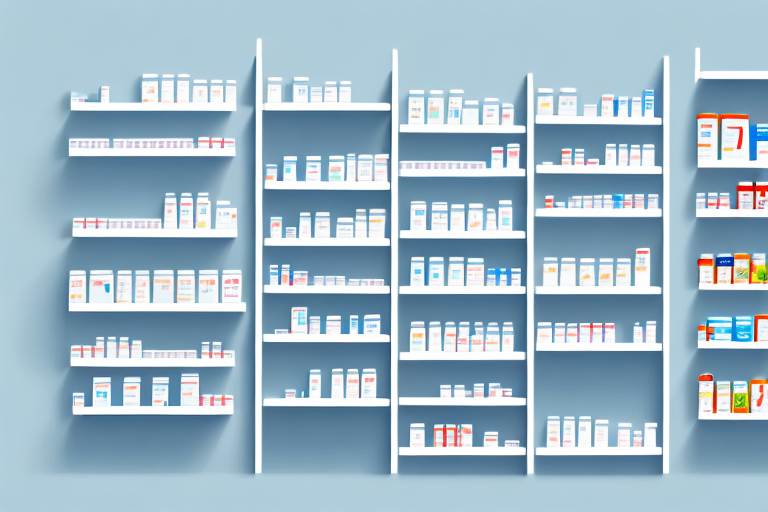What Is a Retail Pharmacy? A Definition and Explanation
A retail pharmacy, also known as a community pharmacy, is a healthcare establishment that dispenses prescription medications and over-the-counter (OTC) medicines to individuals in the community. These pharmacies are accessible to the public and are often located in convenience stores, supermarkets, and shopping centers. In addition to dispensing medications, retail pharmacies offer a variety of services such as medication counseling, health screenings, immunizations, and the sale of health and wellness products.
The Evolution of Retail Pharmacies
Retail pharmacies have undergone significant transformations over the past century. Initially, pharmacies were small, independent establishments operated by apothecaries who compounded medications from herbs and other ingredients. The advent of synthetic drugs and mass production in the 20th century led to the rise of chain pharmacies, which offered a more standardized approach to dispensing medications.
Today, retail pharmacies have expanded their roles beyond simply dispensing medications. Many now offer clinical services such as immunizations, health screenings, and medication therapy management. The integration of e-commerce has also enabled pharmacies to provide online ordering and home delivery services, enhancing convenience for patients. According to the Pharmacy Times, the number of retail pharmacies offering comprehensive healthcare services has increased by 25% over the past five years.
The Role of Retail Pharmacies in the Healthcare System
Retail pharmacies play a pivotal role in the healthcare system by bridging the gap between healthcare providers and patients. Pharmacists are often the most accessible healthcare professionals, providing essential services such as medication counseling, disease management, and preventive care.
Medication Management and Safety
Pharmacists ensure that patients receive the correct medications and dosages, minimizing the risk of medication errors. They also review patients' medication histories to prevent adverse drug interactions. Studies published in the Journal of the American Pharmacists Association highlight the critical role pharmacists play in enhancing medication safety.
Preventive Healthcare Services
Retail pharmacies contribute to preventive healthcare by offering immunizations, health screenings, and wellness programs. According to the Centers for Disease Control and Prevention (CDC), pharmacists administer over 70% of all flu vaccines in the United States, significantly reducing the incidence of influenza each year.
Opioid Addiction and Abuse Prevention
Pharmacies are actively involved in combating opioid addiction by implementing Medication-Assisted Treatment (MAT) programs. These programs combine medication with counseling and behavioral therapies to help individuals overcome addiction. Additionally, pharmacists monitor prescription histories to identify and prevent potential cases of opioid misuse.
Services Offered by Retail Pharmacies
Retail pharmacies provide a broad spectrum of services aimed at improving patient health and wellness. These services extend beyond the traditional dispensing of medications.
Prescription Dispensing
The primary service offered by retail pharmacies is the dispensing of prescription medications. Pharmacists ensure that prescriptions are accurately filled and provide guidance on proper medication use.
Over-the-Counter Medications and Wellness Products
In addition to prescription drugs, pharmacies offer a variety of OTC medications, vitamins, supplements, and personal care products. These items cater to common health needs and promote overall wellness.
Immunizations
Many retail pharmacies provide vaccination services for influenza, pneumonia, shingles, and other preventable diseases. This service increases access to essential vaccines, particularly in underserved areas.
Health Screenings and Testing
Pharmacies conduct health screenings such as blood pressure checks, cholesterol tests, and diabetes monitoring. Early detection of health issues allows for timely intervention and management.
Medication Therapy Management
Medication therapy management (MTM) services involve comprehensive reviews of a patient's medications to optimize therapeutic outcomes and ensure adherence to treatment plans.
Home Delivery and Online Services
With the rise of digital technology, many pharmacies offer online ordering and home delivery services. This convenience is particularly beneficial for patients with mobility issues or those living in remote areas.
Independent vs. Chain Pharmacies: Key Differences
Retail pharmacies operate under two main models: independent pharmacies and chain pharmacies. Each model has distinct characteristics that cater to different consumer preferences.
Independent Pharmacies
Independent pharmacies are typically owned and operated by a single owner or a small group of pharmacists. They are known for providing personalized attention and tailored services to their local communities.
- Personalized Service: Independent pharmacies often foster close relationships with customers, offering customized care and advice.
- Niche Products: They may specialize in unique or alternative medicines and offer compounding services tailored to specific patient needs.
- Community Engagement: Independent pharmacies are deeply rooted in their communities, frequently participating in local health events and education.
Chain Pharmacies
Chain pharmacies are part of larger corporate entities with multiple locations across regions or nationally. They typically offer a more standardized set of services.
- Extensive Services: Chain pharmacies often provide a wide range of services, including home delivery, automatic refill programs, and mobile app integrations.
- Broad Product Selection: They carry a vast array of mainstream products and brands, making them a one-stop-shop for most healthcare needs.
- Advanced Technology: Chain pharmacies invest heavily in technology, utilizing automated dispensing systems and sophisticated inventory management.
Choosing the Right Retail Pharmacy
Selecting the appropriate retail pharmacy involves evaluating several factors to ensure that your healthcare needs are met efficiently and effectively.
Location and Accessibility
Consider the pharmacy's proximity to your home or workplace. A conveniently located pharmacy can save time and make it easier to pick up medications promptly.
Services Provided
Assess the range of services offered, such as immunizations, health screenings, and medication therapy management. Ensure the pharmacy meets your specific health requirements.
Prescription Delivery Options
For added convenience, especially if you have mobility issues or a busy schedule, check if the pharmacy offers home delivery or online ordering services.
Insurance and Cost Considerations
Review the pharmacy's accepted insurance plans and compare medication prices. Some pharmacies offer discount programs or accept generic medications to help reduce costs.
Customer Service and Reputation
Research the pharmacy's reputation by reading online reviews or seeking recommendations from friends and healthcare providers. A pharmacy with excellent customer service can enhance your overall healthcare experience.
The Impact of Technology on Retail Pharmacies
Technology has significantly transformed the landscape of retail pharmacies, enhancing efficiency, accuracy, and patient care.
Electronic Health Records (EHRs)
EHRs enable pharmacists to access comprehensive patient medical histories and medication lists, reducing the risk of adverse drug interactions and improving medication adherence. The Office of the National Coordinator for Health Information Technology reports that EHR adoption among pharmacies has increased by 40% in the past decade.
Telepharmacy Services
Telepharmacy allows pharmacists to provide consultations and verify prescriptions remotely, increasing access to care in rural and underserved areas. This technology gained prominence during the COVID-19 pandemic, ensuring continuous pharmaceutical care despite restrictions.
Robotic Prescription Dispensing
Robotic systems automate the dispensing of medications, enhancing accuracy and efficiency. These systems can process hundreds of prescriptions quickly, allowing pharmacists to focus more on patient-centered services.
Mobile Applications and Online Platforms
Many retail pharmacies have developed mobile apps and online platforms that enable patients to manage their prescriptions, schedule refills, and access medication information conveniently from their smartphones or computers.
The Future of Retail Pharmacy: Trends and Predictions
The future of retail pharmacy is poised for continued innovation and expanded roles within the healthcare system. Emerging trends include:
Personalized Medicine
Advancements in genomics and biotechnology are paving the way for personalized medicine, allowing pharmacists to tailor treatments based on individual genetic profiles and specific health needs.
Integrated Healthcare Services
Retail pharmacies are moving towards offering more comprehensive healthcare services, including mental health support, chronic disease management, and collaborative care models with other healthcare providers.
Data Analytics and Artificial Intelligence
The use of data analytics and AI in retail pharmacies can improve patient outcomes by enabling predictive analytics, optimizing inventory management, and enhancing decision-making processes related to patient care.
Sustainability and Green Practices
Environmental sustainability is becoming increasingly important, with pharmacies adopting green practices such as reducing plastic use, implementing energy-efficient systems, and promoting the proper disposal of medications.
Tips for Saving Money on Prescription Medications at a Retail Pharmacy
- Use Generic Medications: Generic drugs are typically more affordable than their brand-name counterparts while offering the same therapeutic benefits.
- Compare Prices: Price variations exist between different pharmacies. Utilize online tools or call multiple pharmacies to find the best prices for your prescriptions.
- Utilize Prescription Discount Cards: Discount programs and coupons can significantly reduce the cost of medications. Websites like GoodRx offer coupons that can be used at various pharmacies.
- Check for Manufacturer Rebates: Some pharmaceutical companies offer rebates or savings programs for specific medications. Inquire about these options with your healthcare provider or pharmacist.
- Review Your Insurance Coverage: Ensure that your prescriptions are covered under your insurance plan. Sometimes, switching to a different tier or formulary can result in cost savings.
Building a Successful Career in Retail Pharmacy
A career in retail pharmacy can be both rewarding and challenging. To thrive in this field, consider the following:
Educational Foundation
Obtain a Doctor of Pharmacy (Pharm.D.) degree from an accredited pharmacy school. Strong knowledge in pharmacology, medicinal chemistry, and patient care is essential.
Licensure and Certifications
Pass the required licensing examinations, such as the North American Pharmacist Licensure Examination (NAPLEX) and the Multistate Pharmacy Jurisprudence Examination (MPJE). Additional certifications in areas like immunization administration can enhance your qualifications.
Communication and Interpersonal Skills
Effective communication with patients and healthcare providers is crucial. Developing strong interpersonal skills can lead to better patient interactions and job satisfaction.
Continuing Education
Stay updated with the latest developments in pharmaceuticals and healthcare by participating in continuing education courses and professional development opportunities.
Professional Networking
Engage with professional organizations such as the American Pharmacists Association to network with peers, attend conferences, and access resources that support your career growth.
The Importance of Customer Service in Retail Pharmacies
Exceptional customer service is fundamental to the success of retail pharmacies. It enhances patient satisfaction, fosters loyalty, and improves health outcomes.
Empathy and Active Listening
Pharmacists and staff should demonstrate empathy and actively listen to patients' concerns, ensuring that they feel heard and valued.
Personalized Care
Providing individualized care plans and medication counseling helps patients understand their treatments and adhere to their medication regimens.
Efficient Service
Minimizing wait times and ensuring prompt prescription fulfillment contribute to a positive customer experience.
Patient Education
Educating patients about their medications, potential side effects, and proper usage empowers them to take an active role in their healthcare.
Understanding Prescription Drug Laws and Regulations at a Retail Pharmacy
Retail pharmacies must comply with a multitude of laws and regulations to ensure the safe dispensing and distribution of prescription medications.
Controlled Substance Regulations
Pharmacies must adhere to strict guidelines for handling controlled substances, including secure storage, accurate record-keeping, and monitoring for potential abuse.
Prescription Verification
Pharmacists are responsible for verifying the legitimacy of prescriptions, ensuring they are written by licensed healthcare providers and appropriately signed.
Patient Privacy and Data Security
Compliance with the Health Insurance Portability and Accountability Act (HIPAA) is essential to protect patients' personal and medical information.
Proper Medication Disposal
Pharmacies must follow protocols for the safe disposal of expired or unused medications to prevent environmental contamination and misuse.
Health and Wellness Products Available at Retail Pharmacies
Retail pharmacies offer a diverse selection of health and wellness products aimed at promoting overall well-being and preventing illness.
Vitamins and Supplements
Pharmacies provide a variety of vitamins, minerals, and dietary supplements to support nutritional needs and health goals.
Pain Relief Medications
OTC pain relief options, including acetaminophen, ibuprofen, and topical analgesics, are readily available for managing minor aches and pains.
Personal Care Products
Items such as first aid supplies, skincare products, and hygiene essentials are commonly stocked in retail pharmacies.
Medical Equipment and Supplies
Pharmacies often carry medical devices like blood pressure monitors, glucose meters, and mobility aids to assist patients in managing their health conditions.
Conclusion
Retail pharmacies are integral to the healthcare system, providing convenient access to prescription and OTC medications, comprehensive health services, and a range of wellness products. As the industry continues to evolve with technological advancements and expanding roles, choosing the right pharmacy becomes essential for optimal healthcare management. Whether opting for an independent or chain pharmacy, patients benefit from the personalized care, preventive services, and professional expertise that retail pharmacies offer.




















